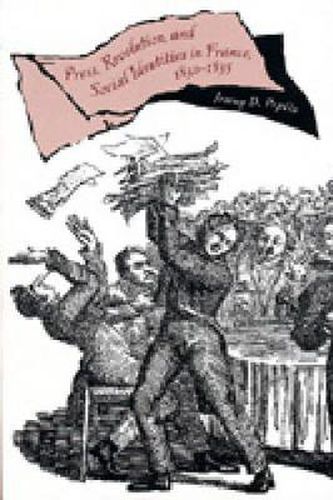Readings Newsletter
Become a Readings Member to make your shopping experience even easier.
Sign in or sign up for free!
You’re not far away from qualifying for FREE standard shipping within Australia
You’ve qualified for FREE standard shipping within Australia
The cart is loading…






In this study of the press during the French Revolutionary crisis of the early 1830s, Jeremy Popkin shows that newspapers played a crucial role in defining a new repertoire of identities - for workers, women and members of the middle classes - that redefined Europe’s public spheres. Nowhere was this process more visible than in Lyon, the great manufacturing centre where the aftershocks of the July Revolution of 1830 were strongest. In July 1830, Lyon’s population had rallied around its liberal newspaper and opposed the conservative Restoration government. In less than two years, however, Lyon’s press and its public opinion, like those of the country as a whole, had become irrevocably fragmented. Popkin shows how the structure of the journalistic field in liberal society multiplied political conflicts and produced new tensions between the domains of politics and culture. New periodicals appeared, claiming to speak for workers, for women, and for the local interests of Lyon. The public was becoming inherently plural with the emergence of new imagined communities that would dominate French public life well into the 20th century. Jeremy Popkin is well known for his earlier studies of journalism during the 18th century and the French Revolution. In Press, Revolution and Social Identities in France he not only moves forward in time but also offers a new model for a cultural history of journalism and its relationship to literature.
$9.00 standard shipping within Australia
FREE standard shipping within Australia for orders over $100.00
Express & International shipping calculated at checkout
In this study of the press during the French Revolutionary crisis of the early 1830s, Jeremy Popkin shows that newspapers played a crucial role in defining a new repertoire of identities - for workers, women and members of the middle classes - that redefined Europe’s public spheres. Nowhere was this process more visible than in Lyon, the great manufacturing centre where the aftershocks of the July Revolution of 1830 were strongest. In July 1830, Lyon’s population had rallied around its liberal newspaper and opposed the conservative Restoration government. In less than two years, however, Lyon’s press and its public opinion, like those of the country as a whole, had become irrevocably fragmented. Popkin shows how the structure of the journalistic field in liberal society multiplied political conflicts and produced new tensions between the domains of politics and culture. New periodicals appeared, claiming to speak for workers, for women, and for the local interests of Lyon. The public was becoming inherently plural with the emergence of new imagined communities that would dominate French public life well into the 20th century. Jeremy Popkin is well known for his earlier studies of journalism during the 18th century and the French Revolution. In Press, Revolution and Social Identities in France he not only moves forward in time but also offers a new model for a cultural history of journalism and its relationship to literature.